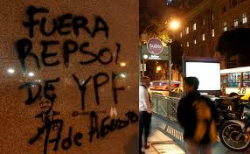
Back in middle of April, the Argentine government announced its re-nationalization of YPF (the company was initially founded in 1922 by the Argentine state), a major Argentine energy player and subsidiary of Spain’s Repsol, with a 51% takeover of the company (taking over 51% of Repsol’s 57% ownership stake). Argentine President Cristina Fernandez de Kirchner justified the takeover, which Argentine lawmakers later approved, citing Respol’s alleged failure to keep investment promises and funneling of profits outside of Argentina through dividend payments.
Repsol countered by accusing Fernandez de Kirchner of not only political opportunism but, more importantly, economic opportunism. The recent discovery of the Vaca Muerta basin, possibly the third largest recoverable natural gas deposit in the world, is what Repsol believes is behind the re-nationalization. This is not Fernandez de Kirchner’s first brush with controversy over her handling of Argentine commodities. Her export tax on Argentine soybean producers brought on months of historic nationwide protests back in 2008 and was eventually defeated.

Predictably, the move to re-nationalize YPF left Repsol, Spain, and the European Union unimpressed. Repsol and the investment firm Yale Texas Capital Corp. sued Argentina in the U.S. District Court in Manhattan demanding that Argentina actually make an offer for its stake in YPF and also demanding compensation for money lost when shares of YPF and Repsol plummeted after the takeover. Repsol’s stock lost approximately one-third of its value since the takeover. Spain also retaliated strongly when it halted imports of Argentine biodiesel, which earned the country $1.2B last year. Finally, last month, the European Union began legal proceedings against Argentina at the World Trade Organization saying the re-nationalization of YPF “was indicative of the worsening business climate in the country that has been seeking to limit foreign imports for the last seven years.” The EU is hoping that others that have voiced their displeasure, including Japan, Australia, and the United States, join the proceedings. Clearly, there is significant international pressure related to the takeover, but it is unclear when there will be a result and what the result will ultimately be. Legal proceedings of this magnitude will likely take years and are extremely unpredictable.
In short, the Fernandez de Kirchner Administration has, again, ruffled feathers at home and abroad with its adventurous protectionist economic policies. It remains to be seen what the results of the YPF affair will be, but in the short term Argentina faces tremendously stiff and powerful opposition on several fronts.
Darren D. Stone is a Partner at McFarland Pyle & Stone, DU Sturm College of Law and Josef Korbel School of International Studies alumni, and former DJILP Managing Editor. He lived in Argentina during the 2008 protests against the export tax.


